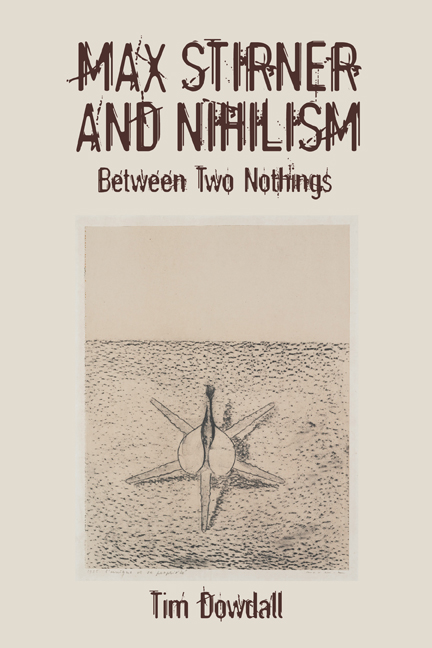Book contents
- Frontmatter
- Dedication
- Contents
- Acknowledgments
- Notes on Sources, Abbreviations, Translations, and Spelling
- Introduction: Stirner: Sinner or Saint?
- Chapter 1 The Origins of Disrepute: Stirner in Context
- Chapter 2 The Meaning of Nothing: Nihilism’s Complex Etymology
- Chapter 3 The Tragic Age for Europe: Nihilism from Nietzsche to Now
- Chapter 4 The Use and Abuse of Nihilism: Stirner under Fire
- Chapter 5 The State of Denial: Stirner and Political Nihilism
- Chapter 6 The Absence of Absolutes: Stirner and Moral Nihilism
- Chapter 7 The Fear of Nothing: Stirner and Existential Nihilism
- Conclusion: Stirner: The Happy Nihilist?
- Bibliography
- Index
Chapter 1 - The Origins of Disrepute: Stirner in Context
Published online by Cambridge University Press: 09 May 2024
- Frontmatter
- Dedication
- Contents
- Acknowledgments
- Notes on Sources, Abbreviations, Translations, and Spelling
- Introduction: Stirner: Sinner or Saint?
- Chapter 1 The Origins of Disrepute: Stirner in Context
- Chapter 2 The Meaning of Nothing: Nihilism’s Complex Etymology
- Chapter 3 The Tragic Age for Europe: Nihilism from Nietzsche to Now
- Chapter 4 The Use and Abuse of Nihilism: Stirner under Fire
- Chapter 5 The State of Denial: Stirner and Political Nihilism
- Chapter 6 The Absence of Absolutes: Stirner and Moral Nihilism
- Chapter 7 The Fear of Nothing: Stirner and Existential Nihilism
- Conclusion: Stirner: The Happy Nihilist?
- Bibliography
- Index
Summary
Max the Obscure
Stirner is commonly regarded as no more than an insignificant, but nonetheless irksome, footnote in the history of German philosophy, a perception, I shall argue, that deserves reconsideration. His influence on subsequent thinkers can often only be surmised, leading at least one observer to suspect a clandestine conspiracy to keep him firmly in the shadows. There are many possible reasons for Stirner's disrepute, not least of which is the explosive nature of his iconoclastic message, which is too unconventional for some and too dangerous for others. Another is that, unlike many of his German predecessors, he makes no attempt to construct a grand philosophical system, but instead articulates the great majority of his ideas in a single work, leading perhaps to their appearing less weighty or significant. Or, equally, it could be because Der Einzige is written in a style that is far from the abstruse complexity found in the work of his predecessor, Hegel, on the one hand, and equally far from the rich, expressive lyricism of his successor, Nietzsche, on the other. In other words, his writing may appear too pellucid to those used to reading Hegel and too dull for admirers of Nietzsche. Whatever the reason, or combination of reasons, for his unpopularity—an issue that will be addressed in more detail in the course of this study—the fact is that Stirner is largely unknown or ignored outside a relatively small circle of anarchists, postanarchists, Marxists, and scholars of (anti-)Hegelianism.
Stirner's lack of prominence is curious when one considers that, even for a time of such intellectual upheaval as the post-Hegelian Vormärz (pre-March period) from 1831 to 1848, Der Einzige is a remarkably radical work. It explicitly rejects as hegemonic myths and fictions (or, in Stirner's terminology, spooks [Spuke] and idées fixes) all the man-made causes to which humans commonly devote themselves, be they institutionalized systems like religion, communism, nationalism, and monarchy, or abstract principles like goodness, truth, freedom, and justice. Rarely, if ever, in the history of ideas has there been such a comprehensive assault on man's convictions and beliefs. Individually, Stirner's Young Hegelian colleagues confronted different elements of the prevailing ideology, as did Feuerbach, for instance, with Christianity and Marx with capitalism, but Stirner assails the entire edifice of human dogma.
- Type
- Chapter
- Information
- Max Stirner and NihilismBetween Two Nothings, pp. 6 - 25Publisher: Boydell & BrewerPrint publication year: 2024

